Do Currencies Need to be "Backed" by Something? The Difference between Currencies and Commodities

Why do people always talk about currencies needing to be "backed" by something? Should the dollar be backed by gold? Does bitcoin have no value because it's not "backed" by anything?
Well hopefully I can shed some light on the subject by giving you my opinion on the matter.
Currencies vs Commodities
First off I want to make clear what the differences between currencies and commodities are. This is where a lot of people get confused when talking about this issue.
Currency
A currency is simply an accounting system, or a ledger system. It gives people the ability to trade with each other without the inefficiencies of a straight barter system.
Example:
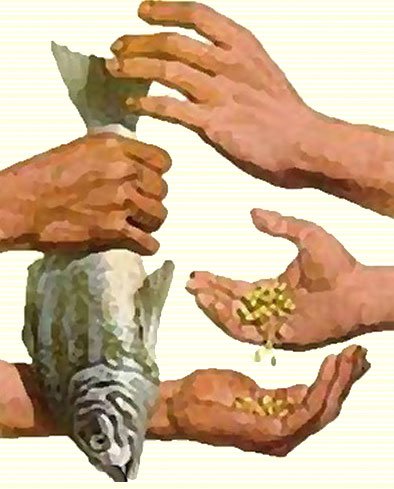
Let's say that I just harvested a bunch of wheat and I am heading into town to sell my surplus. On my way I meet another traveler that has a load of fish. I love fish! As I talk to him I find out that he has too much, so I offer to trade with him for some of his fish. I excitedly show him all of my wheat. Unfortunately, he doesn't want any wheat. This makes a trade impossible. Luckily, I have some currency with me. I offer some to the traveler and he happily trades his fish for some of my currency.
Commodity
A commodity can really mean anything that has value. But most often it refers to things that are more or less fungible, meaning that each item is basically the same as any other item. For example: Oil, gold, copper, wheat, coffee, etc. As long as you are working with the same quality, oil is oil, gold is gold, etc. This makes trading easier because you can know how much oil is worth. So if someone has oil you both can easily agree on the value because all oil (of the same quality) is worth the same.
In my example above, the wheat and the fish are both commodities that have certain values. If the traveler had wanted wheat, we both could easily decide how much wheat would be of equal worth to the fish.
So what gives currencies and commodities value?
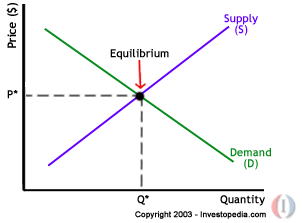
Value is an interesting concept but basically it comes down to supply and demand. The more you have of something, the less each piece is worth, and the more people want it, the more it is worth. The point where those two lines meet is where the value is. You also have to take into account liquidity and volume. The bigger the market (more liquidity and volume), the more accurate the price will be (in general). So value really comes down to how much people are willing to pay for that thing.
Commodities
Commodities derive their value from their utility. People are willing to buy it so they can use it for something. They buy oil so they can make gas to drive their cars. How much is that worth? They buy wheat so they can eat. They buy coffee so they can be addicted ;) That's really why anything has value.
Currencies
So what makes currencies different? Let's look at our example above. Why did the traveler accept my currency? Because it had value of course! But why does it have value? Because he knows that he can trade it for other goods or services in the future. It is useful! Just like a commodity!
So what is its usefulness? It is easy to transport, it is easy to transact (because everyone he knows accepts it as payment), it (hopefully) will hold value over time. These are the things that give currencies their value.
So what does a good currency need? Let's break these down a little more
Easy to transport.

This one is pretty simple to understand. If you had to lug around giant sheets of metal to buy or sell things, it would make it pretty inconvenient. I think many people undervalue coins now because they are less convenient than cash or electronic money. How often do you carry around your quarters to spend on things? Not often? Is it because they aren't backed by anything? No! It's because they aren't worth enough to make it worth the annoyance of carrying coins around with you. The more convenient it is to carry around and use a currency, the better!
Easy to transact
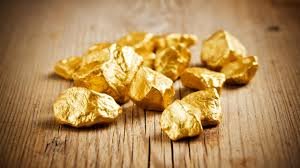
This is referring to your ability to spend the currency, or in other words, does anyone else accept it. Bitcoin is great, but it is less valuable because you can't spend it everywhere. (To be clear, bitcoin is more valuable in other ways that make up for this a little for now, but eventually it will have to be easy to spend your bitcoin to get everything you need) This is where the USD is king, you can spend it almost anywhere and even when you go somewhere where you can't spend it, it is easy to transfer to a different currency that you can spend. You never have to worry about not being able to buy things when you have USD because everyone accepts it.
This also includes the ability to break the currency into smaller pieces. The dollar into cents, bitcoin into satoshis etc. This is one thing that hurts gold because you can only break it down so little before it becomes impractical.
Holds value over time
This is probably the most important thing for a currency. The first two are basically meaningless if the currency inflates so fast that it isn't worth anything. A good currency needs to have a relatively stable value (or possibly be deflationary) so that people aren't afraid to accept or save it. This allows people to trade and save knowing that in the future they can spend their currency without it losing value.
So how do you make sure it holds value over time?
The key to a currency having value is making sure people trust that it will have value in the future. So how do we do that?
This is where a lot of people say "it needs to be backed by something 'real'!" But if currencies are just another form of commodity then would it make sense to tie it to another commodity? Would you only buy wheat if it's price was tied to oil? Or copper if it's value was tied to coffee? What good would that do? It would take supply and demand out of the equation, it would force one commodity to be the same price as another commodity. How would that make any sense?
Let's look at gold backed currency for example. Gold has value because it can be used in electronics, dentistry, art, health, space exploration, etc. Because we like those things, gold has value. But what if we use it as a currency as well? Now it is even more valuable because it has another use. This makes it less valuable to use for its natural uses because we turn it into a currency. This isn't to say that gold is a bad currency, it isn't. It's been used for thousands of years. It's relatively easy to transport, it is easy to spend and it holds its value. So I'm not saying that we can't use gold as a currency or to back a currency, my argument is that we don't have to.
How else can we trust that a currency will hold value?
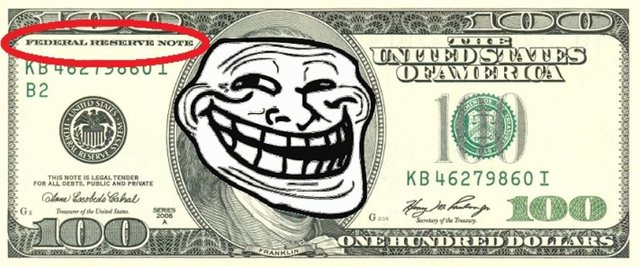
The central banks do a good job of this (in the short term) by manipulating interest rates and printing, they are able to control, to a point, the inflation rate. The problem is that this leads to corruption and likely to a failed currency eventually. Best case scenario we simply have to trust the central banks to do what is right, which I don't like having to trust people I don't know.
Another way that has been shown to work is programing.

This is why we can trust bitcoin. It is programmed to work a certain way and because it is open source and we can see that there isn't a flaw, we can trust it to do what it's supposed to do. I think there might be better ways to do it. (For example, see my post about making a stable cryptocurrency). But the point here is that with programing, we can make a system that people can trust that it will hold value over time, which confusingly, gives it value now.
In Summary
A currency is simply a type of commodity that's use is facilitating trade
A good currency needs:
The ability to be transported easily
The ability to spend easily
The trust of people that it will hold value in the future.
You don't need to tie a currency's value to another commodity, or trust a central bank to assure that it will hold value. We can do it with programming.
Hopefully that makes sense. If you have any questions be sure to comment below. If I'm missing something, please let me know, I don't care if I'm right I'm just trying to discover the truth.
Also, if you felt this post was valuable, please help me to keep writing future posts. Upvote, resteem, follow and leave me some feedback. I'm just getting started on steemit so any suggestions are much appreciated.
Thanks for the great post about a very important topic!
Gold cannot be replaced. Crypto coins can be. Gold will always be worth something even in a Mad Max scenario. We have modern day examples of this too. In countries where the currencies collapsed, people would pan in rivers for small amounts of gold to buy food for their families to eat.
Gold has a couple draw backs however. You have to protect it from theft, and it is not easy to bring your wealth with you when you move from one tax farm on the planet to another. Goldmoney.com allows you to use a credit card to purchase with gold though. They hold your gold in an account, and you buy and sell using the card as you would with other regular cards.
They do the accounting in the background. That type of system can easily be expanded globally too. It also gets around the moving your gold with you problem. You just have to trust the vault that holds your gold. That's a lot better than trusting governments to maintain the value of their currencies.
A lot of people say we are no longer on a gold standard, and I strongly disagree. Governments (banks) still stockpile gold. I'll stop when they do. They are stockpiling it, so technically that means we are still on a gold standard. Those governments know that it will always be valuable, and the rest of their economic decisions are affected by their gold reserves. This is also true for individuals.
All I know is that we need an easy way to make transactions with people without an easy way for governments to devalue what we use as currency. Goldmoney isn't the only way. Perhaps there's a better way. I'm not an expert. All I know though is that crypto is the opposite of Gresham's Law, and good coins will replace bad ones. Well, we never know when a better coin will come, so that doesn't make crypto a very good store of wealth in my opinion.
In other words, it may not always be worth something as gold is.
Thanks for your well thought out and reasoned reply!
I completely agree with your opinion on gold. I think it is probably the most useful commodity to use as a currency for many reasons. It, of course, has it's drawbacks as you've mentioned so I think that the best use of gold right now is as a reserve just in case the internet goes down or something equally crazy happens. Without the internet, I think gold is probably the best form of currency (though I will admit I haven't done much research in physical forms of currency). I think goldmoney.com and similar services are interesting but I think they defeat the point of having gold because if the internet goes down, you are in the same boat as anyone with credit cards, or cryptocurrency.
Gresham's law doesn't really apply to cryptocurrencies as far as I understand it. Gresham's law states that "good money is money that shows little difference between its nominal value (the face value of the coin) and its commodity value (the value of the metal of which it is made, often precious metals, nickel, or copper)". in other words it is referring to two coins that are legally required to be the same value. For example, if two golden eagle coins are legally required to be the same value even if one of them has imperfections. Cryptocurrencies aren't legally required to be the same value as anything and they are fungible (every coin is worth the same as any other coin) So I don't see how it applies. I could be missing something though.
I believe cryptocurrencies are a good example of Thiers' Law, which is kind of the opposite of Gresham's law. It says that in the absence of effective legal tender laws, Gresham's Law works in reverse. If given the choice of what money to accept, people will transact with money they believe to be of highest long-term value. However, if not given the choice, and required to accept all money, good and bad, they will tend to keep the money of greater perceived value in their possession, and pass on the bad money to someone else. In short, in the absence of legal tender laws, the seller will not accept anything but money of certain value (good money), while the existence of legal tender laws will cause the buyer to offer only money with the lowest commodity value (bad money) as the creditor must accept such money at face value.
So if the government doesn't enforce value, good money drives out bad money.
(this is a very interesting train of thought... maybe this will be a future post...)
So to sum up, I think gold is better without the internet and cryptocurrencies can be better when we do have the internet. (and there are some projects to make cryptocurrencies work without an internet connection which is really interesting...)
Thanks again! I wish I had a more powerful upvote for you... Someday. :)
Gresham's Law, as I understood it, was summarized as bad money replaces good money. By that I mean for example how silver money was removed from circulation to leave only non-silver money. Crypto is the opposite in that regard. Good coins will replace bad ones.
Completely agreed about how goldmoney.com suffers from the same issues as other currencies that depend on the bank, payment, and Internet systems to be up and running. I wouldn't consider gold to be the solution to those being down though. Silver and "junk" silver would be better alternatives. Gold would be reserved for very large purchases.
Good point. You would have to get a pretty small piece of gold to buy a candy bar...
The people in Africa were panning for tiny particles of gold to feed their families.
It actually has happened and is probably still happening. Look up the YT videos on it. The situation was very sad. :(
I believe it. I spent a month in Ethiopia several years ago. Very eye opening experience. My dad works for a charity that helps teach people in extreme poverty (<$1 a day) how to be self sustainable so he gets to see first hand what extreme poverty does to society... But there are a lot of good stories too when people get some hope and realize they don't have to wait for the government or the Americans to come and save them.
Interesting
I just realized that I totally misunderstood you about Gresham's law! haha, I thought you were saying that cryptocurrencies would fail because of Gresham's law but you were, in fact, saying that they represented the opposite! Which is exactly what I said in my comment about Theirs' law.
I am very embarrassed and beg your pardon. Thanks for the great input!
You have done a great job explaining and illustrating this topic, @littlejoeward. Congratulations on being discovered by @ocd! Cheers!
Thanks!
Absolutely, @littlejoeward! Cheers!
Reply to this comment if you accept, and are willing to let us share your gem of a post! By accepting this, you have a chance to receive extra rewards and one of your photos in this article may be used in our compilation post!
You can follow @ocd – learn more about the project and see other Gems! We strive for transparency.
Let me know if you have any questions regarding the project or nomination. Hope to hear from you soon!
I guess I accept! :)
Hi @lttlejoeward - nice post!
I agree with you 100% that by virtue of being a successful currency, that currency qualifies to be seen as a commodity. I also agree that a currency need not to be 'backed' by anything - not even the energy related coin that I propose, as I will explain in a future post.
The only way I can see that one can obtain a relatively stable currency, other than by central (inflation) control, is to link the fiction of currency to the realities of the market by marrying its value to some or other commodity in the market.
It is true that fixing the price of any commodity will skew the market.
But is skewing always a bad thing? What if it is bad for the baddies and good for the innocent?
I think you are right. The market needs to be incentivised to keep the value stable. You'd probably find my idea for doing that interesting. https://steemit.com/cryptocurrency/@littlejoeward/cryptocurrency-with-little-to-no-inflation-or-deflation
Basically the idea is to make the commodity that a currency is tied to human working time. If it always takes 1 minute of human attention to create a new coin. The value would stay at the price people are willing to trade their time for. So if the value goes up, more people would start creating more coins lowering the price and if the price goes down less people will make coins increasing the price. I would love to hear your thoughts on it and I look forward to your post!
Followed :)
@originalworks
The @OriginalWorks bot has determined this post by @littlejoeward to be original material and upvoted(1.5%) it!
To call @OriginalWorks, simply reply to any post with @originalworks or !originalworks in your message!
Congratulations! In addition to the vote from @randowhale, you also received a vote from @randowhaletrail!
Congratulations @littlejoeward! You have completed some achievement on Steemit and have been rewarded with new badge(s) :
Click on any badge to view your own Board of Honor on SteemitBoard.
For more information about SteemitBoard, click here
If you no longer want to receive notifications, reply to this comment with the word
STOP